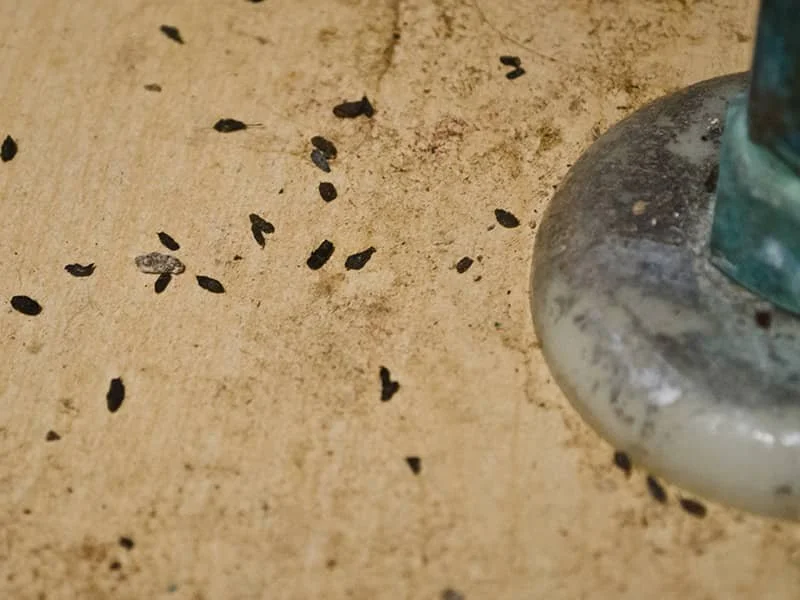Signs of Mice in Your Maine Home: Protect Your Family and Property
Mice can cause surprisingly big problems in your Maine home despite their small size. Beyond the nuisance of finding droppings or hearing strange noises in the ceiling at night, mice pose serious health risks and even fire hazards. At Advanced Pest Solutions, a locally owned Maine pest control company, we help homeowners recognize the early signs of mice and take action before a minor issue turns into a full-blown infestation.
Why You Should Take Mice Seriously
Mice aren’t just an unsightly nuisance. They can carry diseases such as Salmonella, hantavirus, and leptospirosis, contaminating food and surfaces in your home. They also chew relentlessly on anything they can sink their teeth into, including insulation, wires, and wood. In fact, rodent chewing is responsible for thousands of house fires every year, as damaged electrical wiring can spark a fire. According to research, rodents are linked to 20–25% of fires with unknown causes, resulting in 15,000–30,000 house fires annually in the U.S.. That’s a risk no homeowner wants to take lightly.
Maine's Recent Hantavirus Case
Just last month, the Maine Center for Disease Control and Prevention (CDC) reported a case of Hantavirus Pulmonary Syndrome (HPS) in a Maine resident. This is the first case of HPS reported in Maine since 2011 and the second documented case in a Maine resident since U.S. CDC surveillance began in 1993. The individual was exposed to a rodent infestation on their property and has not recently traveled out of state.
Particular species of infected rodents spread Hantavirus through urine, droppings, or saliva. Humans become infected after breathing in fresh aerosolized urine, droppings, saliva, or nesting materials contaminated with hantavirus, or when these materials are directly introduced into broken skin, the nose, or the mouth after touching contaminated objects or eating contaminated foods. If an infected rodent bites someone, the virus may spread to that person, but this is rare. HPS in the United States is not transmitted from person to person. Rodent infestations in and around the home are the primary risk for hantavirus exposure.
This rare but serious illness is an important reminder of the health risks associated with rodent infestations in Maine homes.
Common Signs of Mice in Your Home
Detecting a mouse infestation early is key to avoiding property damage and health hazards. Here are the most common signs Maine homeowners should watch for:
Droppings
One of the easiest ways to spot mice is by finding their droppings. Mouse droppings are small, dark, and pellet-shaped—often found in kitchens, pantries, under sinks, or along baseboards. If you notice droppings in multiple areas, more than one mouse is likely present.
Gnaw Marks
Mice have to gnaw constantly to keep their teeth from overgrowing. Check for small chewed holes in walls, cabinets, cardboard boxes, or furniture, and watch for chewed food packaging. Mice also expose or damage electrical wiring when they chew, increasing the fire risk.
Strange Noises
Mice are primarily active at night, so you might hear scratching, scurrying, or squeaking as you go to bed. These sounds often come from inside walls, attics, or crawl spaces where mice make nests.
Urine Odor
A strong, musky smell can indicate mice are in residence. Their urine can leave a noticeable odor in pantries, basements, or attics, and it often signals a larger infestation that needs attention.
Nesting Material
Mice build nests using shredded paper, fabric, insulation, or other soft materials. If you notice small piles of shredded materials in hidden areas like behind appliances, inside cupboards, or in garages, it’s likely a mouse nest.
Footprints and Tail Marks
You may notice tiny footprints or faint tail marks in dusty areas such as attics or crawl spaces.
Why Mice Are Moving Into Maine Homes Right Now
As the weather cools in Maine, mice often head indoors looking for warmth and something to eat. The trouble is, once they get comfortable, their numbers can skyrocket, so catching the signs early makes a big difference.
The Benefits of Professional Pest Control
While DIY mouse traps and deterrents may catch a few mice, professional pest control is the most effective solution.
At Advanced Pest Solutions, we provide comprehensive and ongoing home pest control plans to eliminate mice and other house-infesting pests, such as ants and spiders.
Benefits of partnering with us include:
Seasonal pest treatments
Ongoing protection against mice, rats, and other pests
No-charge service guarantee for covered pests (we’ll come out in between services if a pest problem arises at no cost)
Don’t Wait for Mice to Take Over
If you notice any of the signs above, don’t wait. The sooner you address a mouse problem, the lower the risk of property damage, fire hazards, and health issues. A quick response can save you hundreds, if not thousands, of dollars in repairs and keep your family safe.
At Advanced Pest Solutions, we understand Maine homes and the unique challenges they face with seasonal rodent activity. Serving Litchfield, Boothbay Harbor, and communities throughout central and coastal Maine, our experienced pest control pros are ready to inspect, eliminate, and prevent mice infestations efficiently and completely.
Reach Out Today!
Contact Advanced Pest Solutions to schedule a professional inspection and safeguard your property from the risks associated with mice. Don’t let a small problem turn into a big one!

